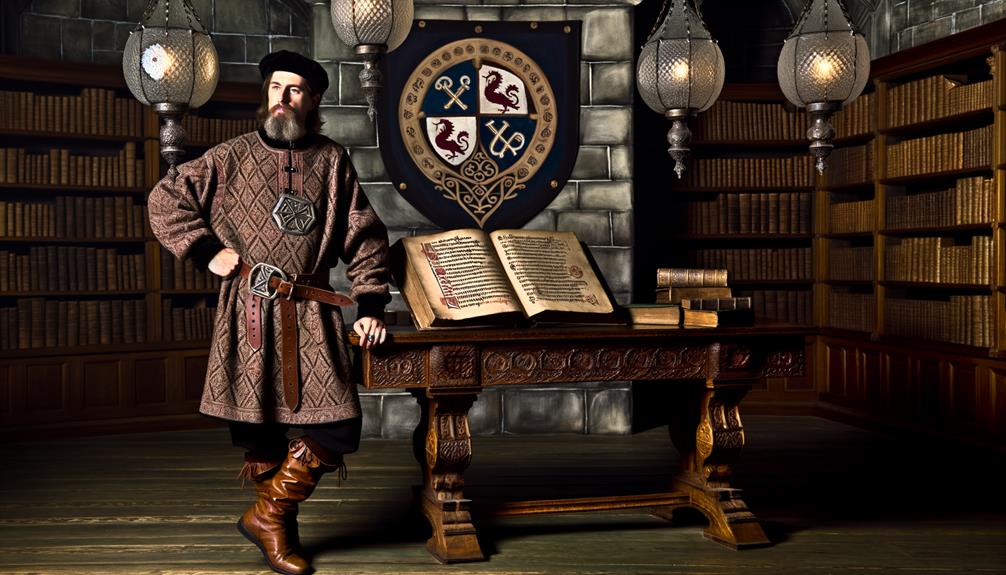Meaning of the Name Archibald
The name Archibald derives from Old High German, combining "erchan" meaning 'genuine' or 'precious' and "bald" meaning 'bold' or 'brave'. The name encapsulates authenticity and valor, hallmarks of nobility from the Middle Ages.
Historically significant in European aristocracy, especially in Scotland since the 12th century, Archibald denotes a 'truly brave' individual. Eminent figures such as Archibald MacLeish and Archibald Cox have borne the name, further embedding its association with distinction and leadership.
This name's rich history continues to captivate through its legacy in literature, politics, and culture, offering more compelling insights into its impact.

Key Takeaways
- The name Archibald originates from Old High German elements.
- 'Erchan' means 'genuine' or 'precious', and 'bald' means 'bold' or 'brave'.
- The name signifies authenticity and valor, reflecting cultural values.
- Historically associated with nobility and aristocracy, especially in Scotland.
- Symbolizes 'truly brave' or 'genuine bold' individual across literature and history.
Etymology of Archibald
The name Archibald originates from the Old High German elements 'erchan' meaning 'genuine' or 'precious' and 'bald' meaning 'bold' or 'brave.'
This etymological composition conveys a dual sense of authenticity and valor, suggesting a person of both intrinsic worth and courageous disposition.
The amalgamation of these elements into a single nomenclature provides a rich linguistic texture, reflecting the cultural values of the period in which it was coined.
The name subsequently evolved through various linguistic stages, retaining its core meanings while adapting to phonetic and orthographic shifts over time.
Understanding the etymology of Archibald offers valuable insight into the historical and cultural contexts that shaped its development, emphasizing qualities esteemed in early Germanic societies.
Germanic Roots
Rooted in the linguistic heritage of the Germanic tribes, the name Archibald exemplifies the profound influence of early Germanic language and culture on contemporary nomenclature. Derived from the Old High German elements ‘Erkan’ (meaning ‘genuine’ or ‘precious’) and ‘Bald’ (meaning ‘bold’ or ‘brave’), Archibald seamlessly integrates these attributes to form a name signifying ‘truly brave’ or ‘valuable boldness. ‘ In addition to its linguistic roots, the name Archibald also holds cultural significance, with ties to noble families and historical figures throughout Europe. The origin and significance of the name Osman, on the other hand, can be traced back to Turkish and Arabic origins, with its meaning conveying strength and leadership in those cultures. Both names exemplify the rich history and diverse influences that contribute to the tapestry of contemporary nomenclature.
This compound construction reflects the Germanic tradition of forming names that encapsulate desirable traits. The Germanic linguistic framework has indelibly shaped the etymological development of many modern names, with Archibald standing as a paradigmatic example. The name's persistence underscores the enduring legacy of Germanic linguistic and cultural influences in shaping personal identities across generations.
Historical Usage
Tracing its historical usage, the name Archibald has been prevalent in various European regions since the Middle Ages, particularly within the nobility and aristocracy. Originating from the Germanic elements 'ercan' (genuine) and 'bald' (bold), the name signified a 'truly brave' or 'genuine bold' individual.
In Scotland, Archibald became prominent during the 12th century, often associated with influential clans and feudal lords. Its adoption by the aristocracy further cemented its stature within historical records and lineage documentation.
The name's enduring appeal can be attributed to its robust connotations of bravery and authenticity, qualities highly esteemed in medieval societal structures. Hence, Archibald's historical usage underscores its significance as a marker of noble lineage and valor.
Famous Archibalds
Notable individuals named Archibald have left a lasting impact across various fields, embodying the name's historical connotations of bravery and authenticity. Their contributions span diverse areas such as literature, politics, and sports, showcasing the versatility and enduring legacy of the name Archibald.
| Name | Field |
|---|---|
| Archibald MacLeish | Literature |
| Archibald Cox | Law and Politics |
| Archibald "Archie" Manning | Sports (Football) |
| Archibald Primrose, 5th Earl of Rosebery | Politics and Diplomacy |
Archibald MacLeish, a distinguished poet and Librarian of Congress, and Archibald Cox, a special prosecutor during the Watergate scandal, exemplify the name's association with intellectual rigor and principled standpoints. Similarly, Archibald Manning and Archibald Primrose illustrate the name's presence in sports and international relations.
Literary Appearances
The name Archibald has been prominently featured in literature, appearing as a classic character in works such as Sir Walter Scott's 'The Antiquary' and continuing to find relevance in modern fiction.
Its etymological roots, denoting 'genuine' and 'bold,' have imbued literary characters named Archibald with traits of authenticity and courage.
This enduring appeal underscores its versatility and persistent resonance across different literary periods.
Classic Literary Characters
In classic literature, the name Archibald often denotes a character of noble or distinguished lineage, embodying attributes of wisdom and authority. This name, of Old High German origin, combines 'ercan' (genuine) and 'bald' (bold), signifying 'truly brave.'
Its literary representations frequently underscore these qualities, offering rich, multi-dimensional portrayals.
- Archibald Craven: A central figure in Frances Hodgson Burnett's *The Secret Garden*, epitomizing a complex blend of sorrow and strength.
- Archibald Grosvenor: From W.S. Gilbert's *Patience*, a satirical character embodying aesthetic pretensions.
- Archibald Cunningham: The antagonist in *Rob Roy* by Sir Walter Scott, manifesting cunning and ruthlessness.
- Archibald Carlyle: A just and honorable lawyer in Ellen Wood's *East Lynne*.
These characters collectively enhance the name's literary gravitas.
Modern Fictional Uses
How has the name Archibald evolved in modern fiction to reflect contemporary values and character archetypes?
The name Archibald, derived from the Germanic elements 'ercan' (genuine) and 'bald' (bold), has shifted in modern literature from its historical connotations of nobility and bravery to embody multifaceted characters.
In contemporary narratives, Archibald often appears as a figure of intellectual prowess or endearing eccentricity, aligning with today's emphasis on individuality and depth.
For example, in J.K. Rowling's 'Fantastic Beasts' series, Archibald serves as a scholarly and resourceful character, resonating with modern audiences' appreciation for cognitive strength and moral integrity.
This evolution illustrates how traditional names can adapt to reflect the changing paradigms of fictional character construction.
Political Influence
Archibald, a name steeped in historical gravitas, has been borne by numerous individuals who greatly shaped political landscapes. This name, of Old High German origin meaning 'genuine' and 'bold,' has been a hallmark of leadership and influence.
Notable political figures named Archibald have left indelible marks on governance and policy.
- Archibald Cox: Special prosecutor during the Watergate scandal, renowned for upholding judicial integrity.
- Archibald Primrose: The 5th Earl of Rosebery, British Prime Minister (1894-1895), known for his progressive policies.
- Archibald Bulloch: A significant figure in the American Revolution, serving as President of Georgia.
- Archibald Menzies: Scottish physician and naturalist who contributed to political diplomacy through scientific exploration.
Their contributions underscore the name's enduring legacy in political circles.
Royal Connections
The name Archibald bears significant royal connections, historically linked to various eminent figures within European monarchies.
This nomenclature has permeated royal lineages, often associated with nobility and inherited titles.
Such regal affiliations underscore the name's enduring prestige and high social standing.
Historical Royal Figures
Throughout history, the name Archibald has been borne by several prominent royal figures, particularly within the Scottish aristocracy. This name, derived from the Old High German elements 'erchan' (genuine) and 'bald' (bold), resonates through the annals of nobility.
The following historical figures exemplify its royal connections:
- Archibald Douglas, 4th Earl of Douglas: Known as 'Archibald the Grim,' he was a significant Scottish magnate and military leader during the 14th century.
- Archibald Campbell, 9th Earl of Argyll: A significant figure in the Scottish Covenanter movement during the 17th century.
- Archibald Primrose, 5th Earl of Rosebery: A British statesman who served as Prime Minister in the late 19th century.
- Archibald Hamilton, 9th Duke of Hamilton: A Scottish peer influential in the early 18th century.
Royal Lineage Influence
In examining the influence of royal lineage, it becomes evident that the name Archibald has consistently been associated with power, leadership, and significant historical impact within aristocratic circles.
Derived from the Old High German elements 'erchan,' meaning genuine or precious, and 'bald,' meaning bold or brave, Archibald has been borne by influential figures in royal courts. The name transcended regional boundaries, becoming prominent in both Scottish and English nobility.
Archibald exemplifies an enduring legacy, often linked to individuals who held commanding roles or influenced pivotal events. Its etymological roots underscore qualities admired by royal lineage: authenticity and courage.
Consequently, the name Archibald remains emblematic of noble heritage and esteemed societal positions.
Noble Title Associations
Archibald, beyond its etymological significance and historical resonance, has frequently been tied to noble titles and royal connections, exemplifying its deep-rooted association with esteemed positions of power. This name, of Germanic origin, meaning 'genuine' and 'bold,' has been borne by numerous figures of aristocracy and royalty, solidifying its stature within noble circles.
- Dukes and Earls: Several individuals named Archibald have held titles such as Duke and Earl, underscoring their high status.
- Royal Advisors: The name has been prevalent among trusted advisors to monarchs, reflecting its association with wisdom and counsel.
- Military Commanders: Archibald has been linked to prominent military leaders, highlighting its connotations of bravery and leadership.
- Historical Legacy: The name's enduring presence in royal lineages attests to its lasting prestige and honor.
Modern Popularity
Despite its historical roots, the name Archibald has seen fluctuating levels of popularity in modern times. The etymology of Archibald, derived from the Old High German elements 'ercan' (genuine) and 'bald' (bold), underscores its noble heritage.
However, contemporary usage has waned, particularly in English-speaking countries, where shorter, trendier names have taken precedence. Noteworthily, the name has retained a niche appeal, often chosen for its vintage charm and distinctive character.
While not commonly found in current top baby name lists, Archibald occasionally experiences revivals due to its unique phonetic structure and historical significance. Nonetheless, its enduring legacy continues to resonate with parents seeking a name imbued with historical depth and cultural richness.
Cultural Impact
The name Archibald has left an indelible mark on literature, history, and popular culture, symbolizing nobility and valor through various epochs. Its etymological roots lie in the Old German 'Ercanbald,' combining 'ercan' (genuine) and 'bald' (bold).
Archibald's cultural impact is multifaceted:
- Literary References: Prominent in classic literature, epitomizing steadfast characters.
- Historical Figures: Associated with influential leaders, exemplifying authority and courage.
- Cinematic Presence: Featured in various films, often portraying characters of distinguished heritage.
- Artistic Representations: Immortalized in paintings and sculptures, reflecting a noble visage.
Understanding Archibald's cultural resonance provides a deeper appreciation for its historical and contemporary significance, embodying a legacy of honor and bravery.
Conclusion
The name Archibald, with its rich Germanic roots and storied history, has traversed centuries, leaving an indelible mark on literature, politics, and royalty.
Its etymological depth, bolstered by notable figures bearing the name, resonates through cultural narratives and modern usage.
As the legacy of Archibald continues to unfold, one cannot help but ponder what future chapters will be written, and how this venerable name will adapt and endure in the ever-evolving tapestry of human nomenclature.






